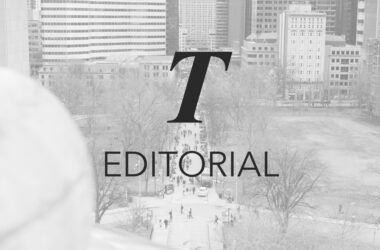 McGill Tribune
McGill TribuneLast week, the Students’ Society Legislative Council updated the 2008 version of the equity policy. There are problems with certain parts of the amended version. While they’re largely definitional problems, they’re anything but semantic. Future interpretations of the words in this document could lead to clubs unjustifiably having their funding cut. The wording of a document with such potential consequences must be perfect, and as right now it definitely is not.
For one thing, councillors amended the original definition of oppression, which was ambiguous, but the amendment is similarly unsatisfactory: “Oppression means the exercise of power by a group of people over another group of people with specific consideration of cultural, historical, and living legacies.” This is grammatically convoluted to the point that it effectively means nothing. It’s unclear, for instance, which party is meant to consider “cultural, historical, and living legacies.” As it reads right now, it sounds like it’s the oppressor’s consideration of “legacies” that makes their power oppressive. Presumably, council meant this to be a consideration taken by the equity commissioners. In addition, the phrase “the exercise of power” is problematic A group of people exercising power over another is the definition of government. SSMU exercises power over students every day: it levies fees, makes decisions about the student centre and events, and claims to speak on behalf of the student body. This definition leaves room for the interpretation that SSMU might be violating its own equity policy by merely existing. Additionally, what exactly are “cultural, historical, and living legacies?” Legacies of what? These will have to be interpreted later, and given both their importance and ambiguity, it’s unfortunate that council will actually have almost no say in what these words will ultimately mean.
Another issue can be found in a section that is supposedly meant to protect free speech, but which can also be read to mean the exact opposite. Section 3.2 states that the equity policy should not be read as limiting dialogue on controversial political issues, provided it’s “on legitimate topics” and “conducted in a respectful, non-coercive, collegial manner that conforms to the policy on discrimination and harassment.” It’s unclear why any part of this, besides mandating conformity to the preexisting policy on discrimination and harassment, is necessary. The Tribune has repeatedly called for a more respectful campus debate, but doesn’t support an attempt to mandate such a thing. The legitimacy of a topic and the respectfulness and collegiality of debate are subjective and open to interpretation and discussion. That an appointed committee has the power to remove a club’s funding if they deem it in contravention of one of these is antithetical to the stated purpose of encouraging open discussion. Independent groups like the Tribune, the Daily, and the Quebec Public Interest Research Group, which operate events in the Shatner Building, but over whose funding SSMU has no influence, pose an additional problem. The worst punishment they can get for violating the equity policy is a demand for a letter of apology. SSMU’s equity policy in effect gives them relatively greater licence to speak freely than the clubs whose purse strings equity can cut.
Even if council knew what they meant when writing this new equity policy, the people who will have to interpret it in future years may not have the same ideas. Solidifying policy into words means it needs to be intelligible for the future. Parts of the new policy are nearly unintelligible now. It needs to be reconsidered.









